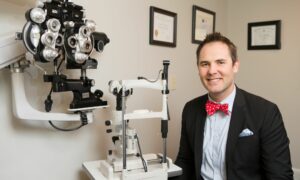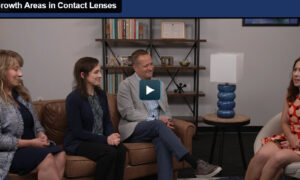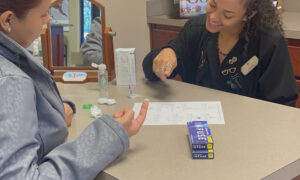By Ellie W. Hattori, OD
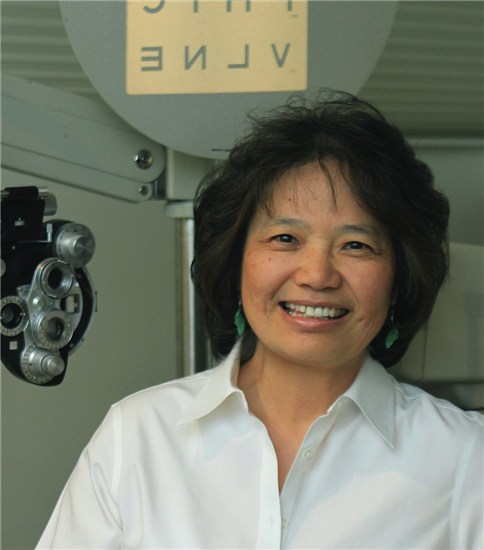
June 24, 2015
SYNOPSIS
In a group practice, dedicate one OD as a contact lens specialist—and promote their special expertise. Patients are assured they are seeing an expert, and it generates referrals from other doctors.
ACTION POINTS
COORDINATE CARE. After patient has CL exam, they are sent to another practice doctor for a comprehensive exam and glasses.
GENERATE REFERRALS. Other doctors will refer difficult CL fits or specialty CL patients when they know your practice has a CL specialist.
EQUIP EXAM ROOM. Include auto-refractor and corneal topographer and diagnostic CL storage space.
In my four-OD practice in Monterey, Calif., I solely see contact lens patients, while my husband, and our two other ODs, are the optometric general practitioners. I have found that offering patients my specialized expertise sends the message that our practice is the place to come if you wear contact lenses. It also allows me to hone my skills in fitting and working with contact lens patients, enabling me to deliver superior care, while freeing up the other doctors in my practice to focus on other specialties.
On the home page of ourweb site, everyone’s role in the practice is explained. I am introduced as the contact lens specialist, and we underscore that we are the first in our area to have the newestcontact lens products.
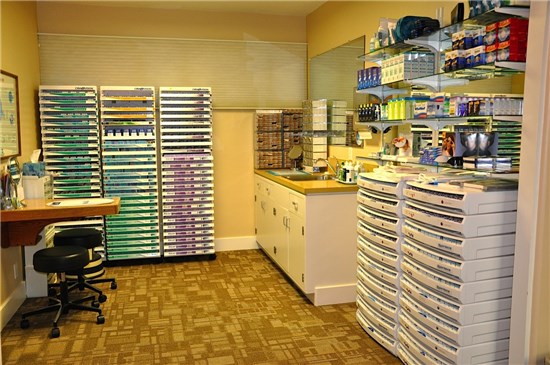
The contact lens room at Hattori Vision Optometrydemonstrates the practice’scommitment to contact lenses. Having one doctor in the practice who specializes in contact lenses instills confidence in patients that you can provide the care they need, Dr. Hattori says.
Is Having a CL Specialist Right for Your Practice?
Approximately 30 percent of our patients wear contact lenses.
If you have a passion for contact lenses, as I do, I don’t think there is a magic number to reach before your practice decides on having one doctor only see contact lens patients. Your contact lens practice will grow once the community is aware of this special service.
It’s important to be able to provide full eyecare service to our patients. In our practice, we have, in addition to myself, ODs who provide comprehensive optometric medical examinations, and an ophthalmologist that specializes in glaucoma. Patients really appreciate it when they know not only most their eyecare can be taken care of at one place, but that we have doctors with specific specialties, with whom we can consult within our practice.
Coordinate Care with Other Practice Doctor(s)
My patients are scheduled to see me for their contact lens examination, and then one of our other ODs see them for their comprehensive medical examination and to get eyeglasses for when they are not wearing contact lenses. However, if the patient, such as a high astigmat, requires eyeglasses to wear over their contact lenses, I determine that prescription during the contact lens examination.
In addition, we always recommend sunglasses for our contact lens patients. To encourage this, we offer a $25 coupon on all of our plano sunwear at the time of their annual contact lens examination.
Build Patient Loyalty & Attract New Patients
Patients appreciate the fact that I “specialize” in contact lenses, and this has generated frequent patient referrals of friends and family, as well as referrals from other ODs and ophthalmologists. I sometimes get calls from other ODs in our area when a patient’s contact lens fitting stumps them. Often it’s a consultation for which lens (soft and RGP)they might try when unsuccessful, or to determine if contact lenses would be appropriate for a particular situation. How to fit compromisedcorneal surfaces, such as patients who have had a corneal transplant, refractive surgery or have been diagnosed with keratoconus, are can be a challenge for some ODs and ophthalmologists in our area, so they often send these patients to me. After providing care, I send those patients back to the doctor who referred them.
Contact Lens Patients in the Practice:
What’s Typical?
Thirty percent of active patients in the average independent eyecare practice wear contact lenses either full-time or part-time. Further, sales of contact lens materials generate 16 percent of practice revenues, and the median contact lens sale per contact lens exam is $152, according to Key Metrics from the Management & Business Academy. —ROB Editors
Equip Exam Room to Specialize in CL Patient Care
My exam room is unique from the other examination rooms in our office in layout, supply and instruments. I have a table where I sit across from the patient, in addition to the usual exam chair. There are two chairs on the patient side, which is nice for consultation, especially when a parent is present. I’ve also found this area very comfortable for simulating near visual tasks.
In my exam room are walls of diagnostic contact lenses, which continues into an adjoining open area. Having my exam room leading open into this area (privacy available if needed with an accordion door), which has a contact lens training table, allows me to work with two patients at a time between the two areas easily. Two instruments I have found very useful with contact lens fittings, that may not be in a usual exam room, are the auto-refractor and corneal topographer.
Dedicate a CL Support Staff
I have found it very helpful to have a dedicated contact lens support staff. My contact lens technician is knowledgeable of all the contact lens diagnostics parameters, so she can pull lenses for patients as I request them. She also makes sure the diagnostic lenses are fully stocked and assists in insertion and removal and contact lens training. She also is our pre-testing technician, so as the patients complete their contact lens examination, she takes them seamlessly into the pre-testing room
Sharing a Personal Story Tied to Your Specialty
Contact lenses made a huge difference in my life–and I share that with patients. They gave me the confidence to look at people when I talked to them, and to participate in sports. Throughout my early school years, I felt unattractive and handicapped with my -7.00D glasses. There is nothing more satisfying for me than to be able to improve a patient’s quality of life, and contact lenses are one way I can do that. There are endless ways contact lenses can be prescribed, and to be able to concentrate solely on this service is a privilege.
Ellie W. Hattori, OD, is co-owner of Hattori Vision Optometry in Monterey, Calif. To contact her: drellie@hattorivision.com

